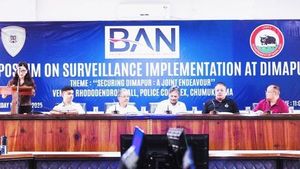Telegram, the widely used messaging application, has been blocked across Chechnya and Dagestan, as confirmed by Yuri Gamzatov, the Dagestan Minister of Digital Development. This significant decision, announced on March 8, 2025, is rooted in concerns over security and the platform's role in facilitating enemy communication.
Gamzatov stated, "The decision to block 'Telegram' in two regions of the North Caucasus Federal District — Chechnya and Dagestan — was made at the federal level based on a submission from law enforcement agencies. It is often used by enemies; for example, the riots at Makhachkala airport. Maybe 'Telegram' will be unblocked later." The blocking is part of broader federal efforts to control platforms perceived to threaten stability, especially following incidents where Telegram was reportedly used to coordinate civil unrest.
The blocking decision follows the riots at Makhachkala airport in October 2023, where approximately 1,200 people surrounded a plane arriving from Tel Aviv during heightened tensions due to military actions occurring simultaneously in Gaza. At the time, reports surfaced indicating the rioters may have communicated using Telegram to coordinate their actions, leading to increased concern from authorities.
Recently, the Stavropol court sentenced four individuals involved in the Makhachkala disturbances to prison terms ranging from 8 to 9 years and 4 months. Further legal actions are anticipated against additional participants as investigations continue. This crackdown on Telegram is seen as part of a wider strategy by the government to mitigate disturbance and maintain public order.
On the same day Gamzatov confirmed the blocking, local authorities had to dispel rumors circulating on social media about the health condition of Dagestan's head, Sergei Melikov. Telegram channels suggested he had been airlifted to Moscow due to worsening health, which authorities hastily denied. This situation has raised additional eyebrows about the influence of unofficial news sources, particularly on platforms like Telegram, which can quickly spread misinformation without verification.
Despite the restrictions imposed on Telegram, Gamzatov encouraged users to transition temporarily to alternative platforms. He suggested using other social media sites, noting, "For the time being, there are good alternatives, for example 'VKontakte.'" His statement reflects the importance of maintaining communication channels for social interaction and news dissemination among residents of the affected regions.
The introduction of this ban highlights the increasing tension within the North Caucasus as regional governments balance the need for security and the public's right to access information freely. Critics are already voicing concerns about the long-term implications of such censorship on civil liberties and free speech within Russia.
While Gamzatov indicated the block is intended as a protective measure, it raises questions about the extent of federal oversight on digital communication and how policies may evolve amid growing unrest. With the societal impact of information technology continuing to expand, the repercussions of this decision will likely reverberate throughout the region, shaping the dialogue around both security and civil liberties.
The growing influence and reach of platforms like Telegram highlight the balancing act between governance and freedom of expression. The reality is complex; as much as these platforms provide connectivity, they can also serve as tools for instigators of unrest. With the regional government taking proactive steps to limit access to such technologies, the broader Russia's relationship with digital freedoms remains under scrutiny, challenging both policymakers and citizens alike to navigate these turbulent digital waters.



